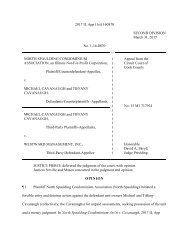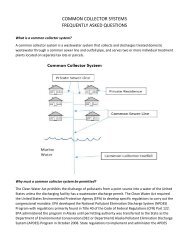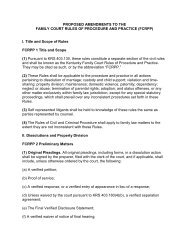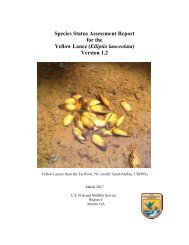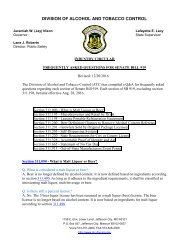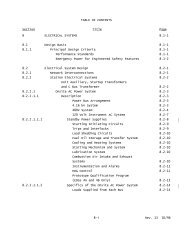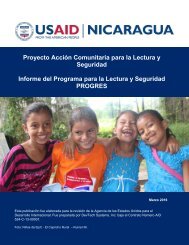COMMUNITY DISPUTE RESOLUTION IN TIMOR-LESTE
PA00MJQC
PA00MJQC
Create successful ePaper yourself
Turn your PDF publications into a flip-book with our unique Google optimized e-Paper software.
mentioned that they sometimes face difficulties when the parties are not able to be reconciled or do<br />
not accept the solutions which are proposed to them.<br />
Connections between the informal and formal justice sector in practice<br />
Much of the time Timor-Leste’s informal and formal justice systems appear to operate in parallel but<br />
in isolation of each other. However, they do at times intersect.<br />
Case summaries produced by JSMP through its court monitoring activities reveal that in some criminal<br />
trials the prior resolution of the dispute by traditional processes is discussed as part of the<br />
proceedings. In one case reported on by JSMP in 2015, the Suai District Court awarded $3000 in civil<br />
compensation to a child victim of sexual assault. The Court noted that the case had been dealt with<br />
through a community dispute resolution and $2000 paid to the victim’s family. However it took the<br />
view that the local procedure had not satisfied the victim’s entitlement to compensation as the money<br />
had been paid to her family. 33<br />
In most cases reported on by JSMP, judges do not state explicitly what impact a previous community<br />
resolution has on the outcome of the court proceedings. Not infrequently community resolutions are<br />
referred to by lawyers or witnesses in the proceeding. Whether judges in fact do take such information<br />
into account – and if so how – is usually not revealed. It may be that, as permitted by the Penal Code,<br />
this is a matter considered in sentencing. 34 However it would be concerning if the court used the fact<br />
of an earlier community reconciliation to presume guilt, thus arguably interfering with the<br />
presumption of innocence. 35 This is an area worthy of further monitoring and analysis.<br />
In contrast, something that is clear from JSMP reports is a significant number of cases resolved by<br />
agreement once they come before a court for the scheduled hearing. In the first quarter of 2016, JSMP<br />
produced case summaries of 260 criminal cases. Of these cases 68 (26 percent) were settled at court<br />
– either as a result of a court initiated conciliation, or based on a request from the complainant to<br />
withdraw the complaint. This procedure may only be used for minor (semi-public) crimes (see further<br />
below). Most of the cases settled in this way involve property damage or minor physical assaults not<br />
involving domestic violence. It appears that in a large proportion of cases, crimes are ultimately<br />
resolved by court-endorsed conciliation or withdrawal of complaint. The readiness of parties to settle<br />
in such cases is clear from the fact that while 68 cases were successfully settled at court, JSMP<br />
reported on only one court attempt at conciliation during this period, which failed.<br />
What this demonstrates is the significant possibility for many minor crimes to be dealt with by<br />
settlement and the withdrawal of formal complaints. It seems likely therefore that the full potential<br />
for diversion of minor crimes to the informal sector is not yet being fulfilled, since these cases are<br />
currently settling only once a scheduled court hearing occurs. If more of these cases were able to be<br />
settled through informal community procedures and withdrawn at an earlier stage, it could reduce<br />
significant pressure on prosecutors, public defenders and the courts. This would also likely be of<br />
significant benefit to the parties involved. Where a matter is not settled until it reaches court, the<br />
delay involved is often substantial. Of the cases reported on by JSMP in the first quarter of 2016, most<br />
were ultimately settled at court more than a year after the incident in question; in some cases many<br />
years had passed. 36 As discussed below, some concerns remain about the ability of community justice<br />
mechanisms to comply with fair trial rights even in the resolution of civil cases. These concerns should<br />
33<br />
JSMP Press Release: Suai District Court sentences defendant to 13 years in prison and orders him to pay<br />
compensation of US$3,000 in case of sexual abuse against a minor, 30 September 2015.<br />
34<br />
Penal Code, article 55(2)(g).<br />
35<br />
At least one JSMP case summary reviewed suggested that this might have occurred: Case Summaries, Dili<br />
District Court, January 2016, summary no.19.<br />
36<br />
JSMP reports may be among the most reliable data currently available on this question. A Ba Distrito<br />
assessment of court functionality in Baucau and Oecusse in September 2014 found that official statistics were<br />
not being kept on the period of time between case initiation and resolution: B. Walsh, Functional Assessment<br />
of the Oecusse & Baucau District Courts: Summary of Assessment Findings and Recommendations, September<br />
2014, p5.<br />
9



